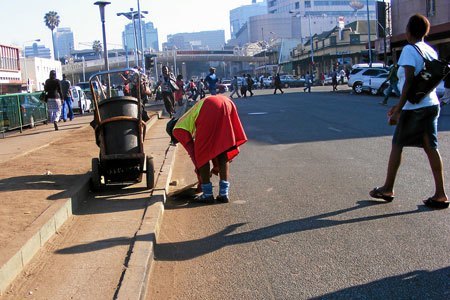
I am sure those that have had first-hand experience will agree with me that having to clean up excretion belonging to even a child is not exactly a pleasant task. Now imagine if you had to clean up excretions from adult people you do not even know!
Environment with Chipo Masara
I know what you are going to read about will, to some, appear somewhat far-fetched and maybe even a little exaggerated. I wish it was. When I heard about it, I too initially thought there could have been some elements of exaggeration by the city cleaners that I talked to, until they offered (if I was strong enough to go through the exercise) to show me the glaring evidence. Two Harare City cleaners, who requested anonymity, took me by the commuter omnibus station at corner Albion and Kaguvi Street. Behind the stationed buses was an insurmountable amount of human faeces lying in a pool of urine, while scattered all over, was mostly plastic bottles filled with a liquid which was confirmed by the cleaners to be urine. Many carelessly discarded empty kaylite containers could also be seen mingling with the urine and faeces. “I know cleaning up the city is what I signed up for; it is my job and I am proud of it, but this (excretions) is not what I signed up for. This is what we have to deal with everyday. I really fear for my health every day,” one of the cleaners said, while her workmate nodded in full agreement. We proceeded to the Copa Cabana bus station and what I saw there was very much disheartening. By the time I was done, I was feeling immensely nauseated. My two guides assured me that what I had just witnessed was a true representation of the situation throughout the city. I then tried to put myself in these cleaners’ shoes and honestly, I could not help seeing the injustice in the situation. It left me wondering what had happened to make people exhibit behaviour associated with stray dogs or wild animals. I was taught from a very tender age that no matter how pressed I got, I could only relieve myself in the safety of a toilet, and nowhere else. Of course there would be some rare occasions when one would be forced to relieve at an inappropriate place, but this would normally be by some bushy secluded spot. This is why I cannot begin to fathom how a normal adult human being can find it proper to not only urinate, but actually defecate right in the middle of the capital city! We have often talked of our on-going battle with litter and how some people among us are comfortable going around throwing their litter everywhere. Some initially argued that the litter scourge was as a result of city cleaners not doing their job, which later turned out to be untrue. In fact, city cleaners clean up every day, but people keep on littering. Although I feel that cleaning up papers, plastics, bones, and stuff like that is somewhat understandable, expecting them to deal with peoples’ urine and faeces is highly unfair. Considering this situation, one can see why Zimbabwe has been battling with a persistent typhoid scourge. As long as this situation persists, I foresee the health problems staying put. It is surely time city by-laws were re-visited in a more serious manner so Zimbabweans can once again know what to do and what not to do in public. But more urgent is the issue of city cleaners’ health. Cleaning up human excretion on the streets is honestly not what they signed up for!

Kombi operators main culprits: cleaners
- Chamisa under fire over US$120K donation
- Mavhunga puts DeMbare into Chibuku quarterfinals
- Pension funds bet on Cabora Bassa oilfields
- Councils defy govt fire tender directive
Keep Reading
City cleaners singled out the commuter omnibus operators as the main culprits, which was believable considering that the bulk of the excretion is found at their spots, and because they generally appear quite unbothered by such an environment. Night entertainment spots were also said to be trouble spots. The commuter operators I later talked to, although not admitting guilt to public excretion, blamed the practice on the lack of sufficient public toilets in the city. They added that the exorbitant prices charged to use some public toilets were out of their reach.










